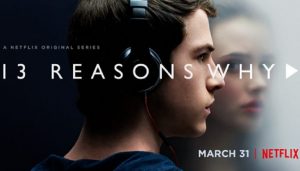The good
June 1, 2017
Jay Asher’s Thirteen Reasons Why has made its way onto screens after seven years of being a popular novel amongst young people. If anyone has jumped on the bandwagon, they know that Thirteen Reasons Why entails the unfortunate events that lead up to Hannah Baker’s suicide. There has been controversy across social media following the release of the Netflix original, and some debate whether or not the show is appropriate. Towards the end of the season, scenes become more and more explicit to the point where it is almost hard to watch due to the graphic nature of some of the content. Despite the shock factor of a few scenes, Thirteen Reasons Why is full of valuable lessons that its audience can learn from. Those who believe the show may be too graphic have most likely not read the original novel, as the novel represents exactly what the show is trying to achieve. “I think the tv show allows you to see into the minds of all of the other characters and what they’re going through,” said Ashlyn Suloff (11). Like Hannah Baker says, “everything affects everything.” This show is a great example of this message, and it is important that the true purpose of this show is focused more on than its sometimes disturbing details.
When looking past the more “mature” aspects of Thirteen Reasons Why, it is evident that these nearly gruesome details need to be presented in order to achieve the full impact intended. “Having a mental illness is very graphic,” said Krista Proksch (11), “so you can’t portray having a mental illness without being true to it.” Yes, some scenes are hard to watch; however, they are needed to show just how intense a mental illness can be. Censorship would have taken away from the intended impact on the audience because those details are needed to tell the story. Suicide is not beautiful or graceful, and Thirteen Reasons Why does an amazing job of accurately depicting this. “Personally, I think the way they depicted suicide is extremely scary and off-putting, so I don’t think it would make anyone want to do that,” said Suloff. This show is not about glorifying suicide through graphic scenes but about showing how our own actions can affect other people’s’ lives in ways we can’t imagine. It is important to remember that Thirteen Reasons Why is not intended to make light of suicide or mental illness, rather bring light to an issue that is so often ignored in society.
Thirteen Reasons Why is effectively a wake up call. It presents the harsh realities of mental illnesses along with the unintended consequences of others’ actions, often hurtful ones. Mental illnesses cannot be seen, and this is evident through the plot of Thirteen Reasons Why. “Even if you’re not going through something like that, I think it is still a good way to bring attention and awareness to suicide,” said Suloff. Glorifying and bringing awareness to an issue as serious as mental illness are two very obviously different situations, and this show does an astounding job of bringing awareness to the issue at hand rather than glorifying it. Each aspect and detail of both the novel and tv show remind us that our actions really do affect others, and this realizes the idea that we never know what is going on in other people’s’ lives. “These are things that are actually happening in our world and in our own communities that affect lots of people, and we may not even know,” said Proksch, “so if you go into watching it and you don’t have that responsibility, I think that’s where the jokes come out.” Mental illnesses and suicide are no laughing matters and neither is Thirteen Reasons Why. Serious measures need to be taken when bringing awareness to serious issues. Thanks to this show, individuals are able to reevaluate how they treat other people in society and realize how their actions may impact other people’s lives.
There are thirteen sides to Hannah’s story, but we do not know if we are one of thirteen to someone else. Hurtful actions along with an unrecognized brokenness can lead to devastating consequences for an individual, and we need to learn from the lessons presented in Thirteen Reasons Why in order to prevent such consequences from occurring. This show needs to be a model for what can happen when no one pays attention and no one helps. Rather than seeing it as glorification of suicide and mental illness, we need to take into account just how real this show is. Suicide and mental illness could impact anyone, but do we actually know who is suffering?




